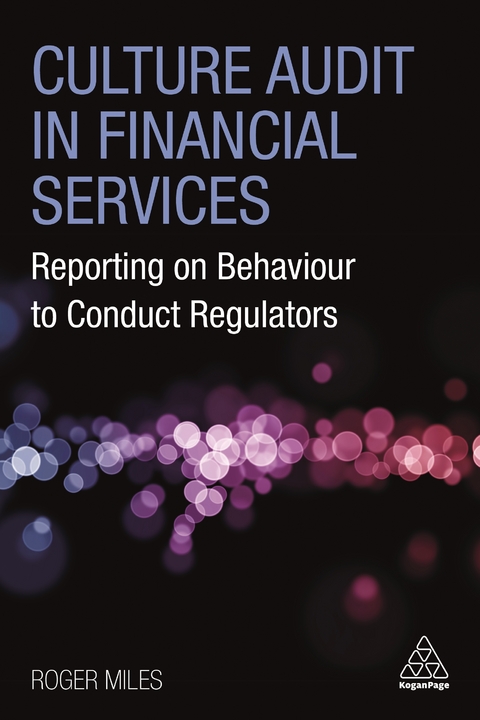
Culture Audit in Financial Services
Kogan Page Ltd (Verlag)
978-1-78966-777-6 (ISBN)
In the next wave of conduct regulation in financial markets, from 2021 conduct regulators in the UK and elsewhere expect firms to produce evidence on how they are improving behaviour and culture. Facing this, many practitioners are anxious that their current reporting and management information (MI) are irrelevant to meeting as-yet unclear regulatory expectations.
This book provides the insights and tools firms need to report on culture, securing both enhanced business value and the regulator's approval. Culture is now seen as a key contributor to good governance, feeding into existing discourse on environmental, social and governance (ESG) factors and the emerging dialogue on 'non-financial (mis)conduct', but conventional measures of business quality are unfit for the new reporting agenda. Culture Audit in Financial Services follows the arc of 'behavioural regulation' to examine what the regulator really wants, before offering guidance on how culture audit differs from conventional auditing, how to put the latest pure-research findings to work, and the key features of well-designed conduct and culture reports.
Written by an impartial author and a variety of contributors with extensive experience working with practitioners, regulators, and many of the world's finest academic initiatives, this book is filled with practical, grounded advice on how best to approach this new challenge and avoid infractions.
Dr Roger Miles researches behavioural risk and the impacts of conduct regulation. He is Head of Faculty for UK Finance's Conduct and Culture Academy, an industry-wide initiative which gathers, establishes and disseminates 'best practice' in the measurement and regulatory reporting of human-factor risks. He counsels Boards on human risk factors and uncertainty, delivers bespoke risk workshops for leadership groups in a variety of sectors, and is regularly called upon to liaise with professional groups internationally.
Chapter - 01: A culture quest for ‘better behaviour;
Chapter - 02: ‘How regulators’ ‘behavioural approach’ went global – with culture its latest focus;
Chapter - 03: ‘The house is on fire - How regulators own research has pointed to ‘culture reset’;
Chapter - 04: What’s the big idea? (1) - How conduct regulators use behavioural science;
Chapter - Interlude One: From poacher to gamekeeper to poacher… to scientist - A supervisor’s tale;
Chapter - 05: What’s the big idea? (2) - Regulators’ challenge to firms - framing ‘purposeful culture’;
Chapter - 06: A ‘behaviour-at-risk’ agenda emerges - Questioning purpose, lost trust and cultural coercion;
Chapter - 07: The new mindset and language of culture - Assessing financial and non-financial conduct;
Chapter - 08: Audit basics - How the practice of culture audit differs from conventional auditing;
Chapter - 09: The new management reporting information (MI) for culture Part 1 - Getting past the old MI;
Chapter - 10: The new reporting Part 2 - Developing the framework - from culture models to better questions and indicators;
Chapter - Interlude Two: Case example - Culture rating in a retail bank;
Chapter - 11: Interventions and enforcements - How regulators have responded to a ‘culture crisis’;
Chapter - 12: Intelligence gathering versus surveillance - Tried and failed methods; putting the latest research tools to work;
Chapter - Interlude Three: A sector-wide group seeks culture ‘tells’ - (Observing indications of good and poor conduct);
Chapter - 13: Putting respected research tools to work, example 1 - Tools for cultural transformation - Barrett Analytics;
Chapter - 14: Putting respected research tools to work, example 2 - Using the CultureScope ‘combined analytic’ to deliver measurably better culture;
Chapter - 15: What regulators really want - Wrap-up and look ahead;
Chapter - 16: Glossary;
Chapter - 17: Recommended reading;
"Culture Audit fills a welcome gap between procedural "how to" manuals which can be dull and conceptually empty, and academic research, which is often brilliant but difficult to translate into real organizational programs and initiatives. This book takes many of the best ideas out there from behavioral science, then sets them within a framework with action points making it genuinely useful for practitioners. The lively writing and provocative examples really help overcome the difficulty of making culture a practical consideration for companies without losing important nuances. This work deserves to make a big positive impact."
"Just what the finance industry wants, and more importantly, what it needs. A definitive "How to" guide to understanding your firm's culture, its strengths and weaknesses, and, most importantly, how to systematically and thoroughly set about improving it throughout your workforce and firm. Packed with helpful real-life anecdotes from finance experts, academics' and regulators' perspectives, helpful history, insightful psychology, and pithy "sidebars" which neatly illustrate key points. A clear-sighted, up-to-the-minute view on progress made and what's left to do. This will long be seen as the magnum opus on this critical topic - and it is compelling reading at that. If the industry follows even half of the good advice here it will be in a much better place a few years from now."
"I really like the multiple-author approach, and what a list of co-authors! There's huge value in just being able to read insights from this remarkable group of people all in one place. Their different perspectives throughout, and their evident sense of fun, make Culture Audit really engaging and thought-provoking. A set of 'Interlude' stories also brings the theory to life, such as the hugely enjoyable account of how a central bank supervisor went on to 'rebrand' an investment bank's compliance department as behaviour-aware - a mindset shift that would benefit many firms.
Culture Audit's view of the genesis of conduct regulation, and robust predictions for its future, ground our understanding of why it's now so vital for firms to focus on culture and behaviour. The book is always engaging - it's as if the reader is enjoying a chat with the authors - and thankfully avoids getting bogged down in regulatory small print. With so much still to be done to improve financial sector culture, here's a book which really will spark timely conversations in firms: importantly around purpose, psychological safety, diversity and inclusion. These are vital foundations for any firm to set out, then act on to start a lasting culture change. Culture Audit jump-starts these conversations in a friendly, understandable way. It's a great addition to the discourse."
"This masterful book gives the reader an easy lens to get familiar with the latest thought and regulatory agenda for supervising financial firms' conduct and culture.
Following to the global financial crash and numerous scandals such as LIBOR rigging and mis-selling, we have seen a shift from a consumer protection regime based on disclosure, towards a new focus on the root cause of misconduct: firms' culture. Culture Audit answers many questions that will be on the minds of firms' executives and compliance professionals, as well as regulators. Uniquely, this book addresses head-on the controversial topic of how people opt for different roles at different career stages, moving between regulatory agencies and commercial roles. This brings a fresh perspective so we can reflect in a new way on how regulators and firms interact.
A summary condensed from years of research, empirical experience, hundreds of real life talks and sharing by firms' executives, this book is a joy to read, for its clear setting out of theory and its practical action points. Dr Miles is a fascinating guide as he unlocks a door to the secrets of human minds, group dynamics and applying behavioural science to financial services. With an impressive group of colleagues, he addresses the big questions: What is culture and conduct? Why do regulators care about culture and conduct, as opposed to codified laws and regulations?, and more importantly: What shall we (the firms) do in response to the call? Arguing for a clear difference between conventional audit and culture assessment, it rightly also questions even whether the term culture audit is broad enough to yield the "better questions" that firms now need to ask themselves."
"An all-round excellent reading experience: crisply written, with sharp graphics and pithy fact boxes. Culture Audit is packed with clear, current and bright insight - which is no less than we'd expect from the world-leading practitioner experts behind it. Even more impressively, they address it all in a way that's engaging, easily readable and (who'd have expected this?) frequently entertaining. Every regulated finance professional with any leadership responsibilities should read this book."
"So many books have only one idea; this one has so many from Roger Miles and his co-authors. A broadly useful book with all kinds of lessons for all kinds of practitioners. As well as efficiently tapping into key high-level research findings, readers will discover how in practice to match culture and conduct principles with the needs to their organisation's stakeholders - including regulators of course. The UK and international context is thoroughly current and well evidenced with real life examples, a full glossary and plentiful references. Everything you need is in one place. A thoroughly worthwhile read!"
"What a timely book! Plenty here to interest financial services regulation practitioners. It seems extraordinary that we are still talking about culture, more than twelve years after the global financial crisis exposed such huge problems in financial institutions. With great clarity, the authors have explained why these problems persist and if this book can help to improve culture then they've done a fine job.
Culture Audit contains a wealth of knowledge including a topical chapter on the behavioural science techniques that supervisors have adapted in recent years. A vast amount of research and analysis from leading industry thinkers has clearly gone on behind the scenes to enlighten the reader, yet the authors keep the tone straight-talking, lucidly unpacking complex and technical topics without compromising the quality of the analysis. For those whose interest is piqued, a list of further reading is provided in the appendix and there's a properly helpful glossary.
Culture Audit is very likely to achieve its aim of starting a wider conversation about conduct and culture across the regulated financial sector and beyond."
"It isn't very often that I would recommend to my book club what appears from the title to be an academic read - but this one breaks the mould. The team of writers has delivered an insightful and practical book that manages to be both strategic and operational, as needed, besides often letting the reader pause to reflect and consider how this all supports their own personal development. The 'story' interludes bring the chapters together in that really useful, involving way that storytelling has, of leading the reader towards understanding and applying the concepts in real life. A thoroughly worthwhile read."
| Erscheinungsdatum | 26.05.2021 |
|---|---|
| Verlagsort | London |
| Sprache | englisch |
| Maße | 162 x 240 mm |
| Gewicht | 955 g |
| Themenwelt | Recht / Steuern ► Allgemeines / Lexika |
| Recht / Steuern ► EU / Internationales Recht | |
| Recht / Steuern ► Wirtschaftsrecht ► Bank- und Kapitalmarktrecht | |
| Wirtschaft ► Betriebswirtschaft / Management ► Allgemeines / Lexika | |
| Wirtschaft ► Betriebswirtschaft / Management ► Finanzierung | |
| Betriebswirtschaft / Management ► Spezielle Betriebswirtschaftslehre ► Bankbetriebslehre | |
| ISBN-10 | 1-78966-777-1 / 1789667771 |
| ISBN-13 | 978-1-78966-777-6 / 9781789667776 |
| Zustand | Neuware |
| Haben Sie eine Frage zum Produkt? |
aus dem Bereich


